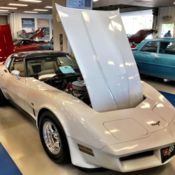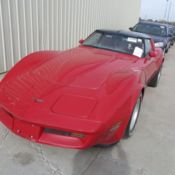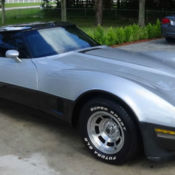Description
For more information. please call Jim --- 215-834-0754"In 1981. there was only one powerplant available. a 350 cu in (5. 7 L) engine that. like the L-48 base engine the previous year. produced 190 hp (142 kW). but was now designated the L81. The motor was certified in all states and available with manual or automatic transmissions. Chrome air cleaner lids and cast magnesium valve covers dressed up all engines. The stainless steel exhaust manifolds and computer control system introduced on the 305 cu in (5. 0 L) California engines the previous year were now standard. as was an auxiliary electric engine cooling fan. This. the last C3 available with a manual transmission. so equipped. had a published 0-60 mph in 8. 1 seconds. This model year was the first to use a fiberglass rear spring. now a Corvette trademark. The spring saved thirty-six pounds. but was limited to base suspensions with automatic transmission. When equipped with Delco's new optional ETR (Electronically Tuned Receiver) radio with digital clock. the quartz analog instrument panel clock was replaced with an oil temperature gauge. The cast aluminum wheels. optional since ’76. were now ordered on 90 percent of the cars at a cost of $428. [6] New options included a power adjustable driver’s seat and power remote outside mirrors. In mid-1981 production shifted from St. Louis. Missouri to Bowling Green. Kentucky. and several two-tone paint options were offered. "(Excerpt from Wikipedia. com)"1981 was the first year Corvettes were ever produced in two factories at one time. The new Bowling Green. Kentucky plant produced its first Corvette on June 1. 1981 while the St. Louis plant was producing its last Corvettes. The last St. Louis Vette was produced on August 1. 1981. All St. Louis Corvettes were painted with lacquer paints while the new Bowling Green plant had a brand new paint facility and used enamels with clear top coats. 1981 was the last year a manual transmission was available until late in 1984 with the C4. Automatic transmission Corvettes were equipped with a new fiberglass re-enforced rear mono-spring. This spring was 33 pounds lighter than the steel spring. Cars with the manual transmissions or the Gymkhana suspension package still received the steel spring. A new two-tone paint process was available for the first time from the Bowling Green factory. The computer command control which was used on the California Corvettes in 1980 was now standard on all Corvettes. The stainless steel exhaust manifold from the California Vettes was also standard. it weighed 14 pounds less than the cast iron manifold and flowed better as well. A new chromed air cleaner cover was added to the engine compartment. California buyers could finally buy a manual Corvette this year. A quartz clock was now standard and a six-way power seat was optional. Electronic tuning radios could have an optional CB radio or an 8-track tape player. 1981 marks the first year that Corvette body style numbers were incorporated into the VIN number instead of being a separate number. "(Excerpt from Vettefacts. com)



